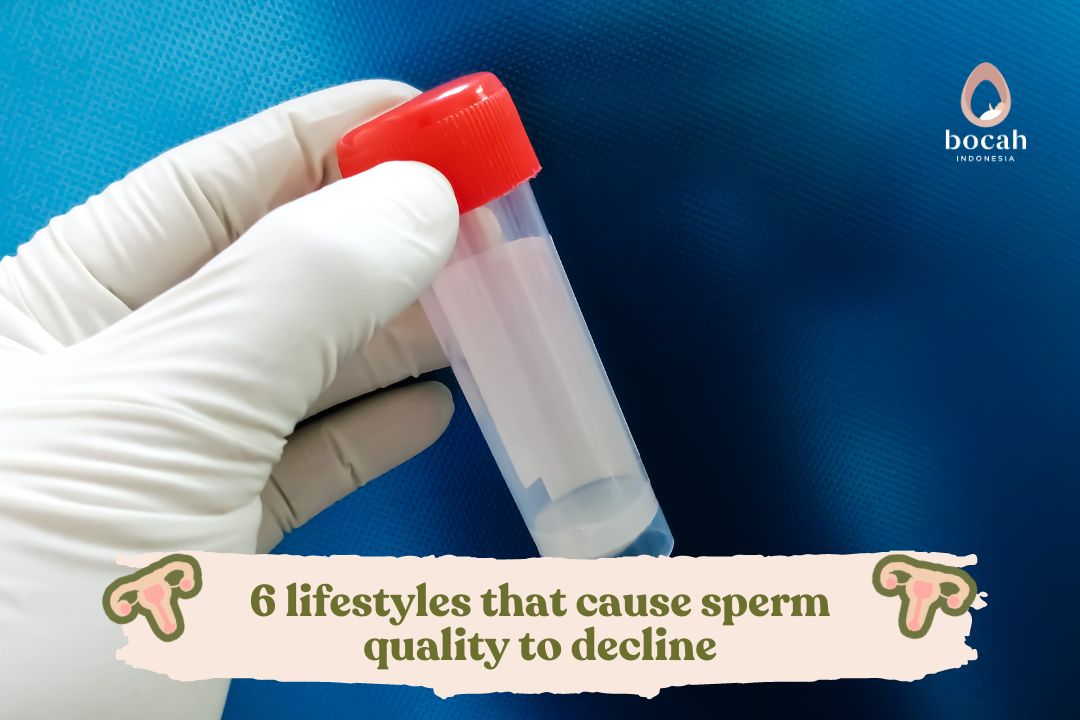Increase Your Chances of Getting Pregnant with a Balanced Lifestyle

To increase the chances of pregnancy, a balanced diet and proper nutrition play a crucial role. Discover healthy lifestyle tips for conception.
A healthy diet not only helps parents stay fit but also impacts fertility and prepares the body for pregnancy. There are several nutrients that need to be fulfilled while trying to conceive.
Folic acid, protein, and complex carbohydrates are some of the essential nutrients that should be met by those trying to conceive quickly. Let’s find out the healthy eating patterns for parents to support the arrival of a baby.
Here are some healthy lifestyle tips and balanced nutrition that parents can apply to support a successful pregnancy:
1. Meeting Your Folate Needs
Folate is an essential nutrient for the health of the fetus during pregnancy. When you are planning a pregnancy or following a conception program, it is important to ensure that your body has enough folate.
Tanya Mincah tentang Promil?
Why is folate so important? Folate helps prevent the risk of the baby being born with neural tube defects, such as spina bifida. Therefore, it is advisable to have sufficient folate in your body even before you become pregnant.
Doctors may recommend that you take a folate supplement of 400 micrograms daily before pregnancy and continue taking it until you reach 12 weeks of pregnancy.
So, you can start thinking about your folate intake now, to ensure your body is ready when you get pregnant. Remember, meeting your folate needs is crucial for the health and development of the fetus.
Folate is not only beneficial for women. Some studies have shown that folate intake can also play a role in enhancing male fertility.
Folate plays an important role in DNA synthesis and cell growth, including sperm. A deficiency in folate can cause sperm damage and reduce sperm quality, which can decrease fertility.
Several studies have shown that folate supplementation in men can improve sperm quality, including count, motility, and morphology. In one study, men who took folate and zinc supplements for several months showed significant improvements in their sperm parameters.
However, more research is needed to better understand the relationship between folate and male fertility. Nonetheless, since folate is important for sperm health and overall reproduction, many experts recommend that men also pay attention to their folate intake, especially if they are planning a pregnancy with their partner.
If you have any questions about your folate needs or how to get it, do not hesitate to consult with an obstetrician. The doctor will provide advice and guidance tailored to your health needs.
2. Meet Your Protein Needs
Protein is crucial for your health and the growth and development of the fetus you are carrying. Fathers also play an important role in ensuring adequate protein intake to support reproductive health. Protein is needed to maintain optimal sperm quality.
To ensure you get enough protein, add protein-rich foods to your daily menu.
There are two types of protein you can choose from: plant-based protein and animal-based protein. Plant-based protein can be found in foods like nuts, tempeh, and tofu.
Animal-based protein can be obtained from chicken eggs, skinless chicken meat, lean beef, and fish. Fish, in particular, is a good choice because it contains lean protein and omega-3 fatty acids, which are very beneficial for your health and the fetus.
By adding protein sources daily, you can ensure your body gets enough nutrients to support the health and development of the fetus, as well as help you stay strong and fit during pregnancy.
A balanced protein intake for fathers can help improve fertility by supporting the formation of healthy sperm.
So, make sure to consume a variety of protein sources every day to meet the nutritional needs of both you and the fetus.
3. Increase Your Consumption of Fruits and Vegetables
Fruits and vegetables are essential sources of antioxidants that help maintain the health of body cells, including sperm cells in men and egg cells in women.
So, if you want to increase your chances of getting pregnant, it is highly recommended to consume at least five servings of fruits and vegetables every day. One serving can be measured as a medium-sized orange, for example.
There are many fruit and vegetable options you can consume, such as leafy greens, tomatoes, oranges, grapes, watermelon, or avocados.
By consuming a variety of fruits and vegetables, you can ensure that your body gets a range of nutrients and antioxidants needed to support reproductive health and increase the chances of pregnancy.
4. Choose Complex Carbohydrates
Complex carbohydrates are a healthier type of carbohydrate because they have a high fiber content. It is recommended to choose complex carbohydrates such as brown rice, whole wheat bread, vegetables, fruits, legumes like green beans, and whole grain cereals.
These complex carbohydrates are rich in fiber, which helps the body regulate blood sugar levels more steadily. Stable blood sugar levels are very important for fertility health, as high or low blood sugar fluctuations can affect hormonal balance and reproductive function.
By consuming complex carbohydrates, you can help your body stay healthy and nutritionally stable, as well as improve overall fertility.
5. Drink Full-Fat Milk
Compared to low-fat milk, full-fat milk is more likely to improve fertility and the chances of pregnancy. Therefore, it is highly recommended that you drink at least one glass of full-fat milk every day, or as advised by your doctor.
Additionally, you can consume other dairy products like cheese and yogurt that contain calcium and other essential minerals.
Calcium also plays a role in maintaining the health of the nervous system and muscles, including the muscles involved in uterine contractions during labor.
By regularly consuming milk and dairy products, you can ensure your body gets enough calcium and other essential nutrients to support fertility, pregnancy, and a healthy delivery.
6. Quit Smoking
It’s very important to prepare a healthy body before pregnancy. Therefore, avoid smoking while planning pregnancy and during pregnancy. This is because smoking has many dangers to your health and the development of the fetus.
Smoking while planning pregnancy can reduce your chances of conceiving and increase the risk of health problems for the baby later on. The same goes for fathers; smoking can affect sperm quality, which can also impact fertility.
When pregnant, smoking can cause serious problems, including the risk of premature birth, low birth weight, and an increased risk of Sudden Infant Death Syndrome (SIDS). Smoking also increases the risk of miscarriage.
Therefore, quitting smoking when planning pregnancy and remaining smoke-free during pregnancy is an important step to protect your health and the health of the fetus from the dangers of smoking.
7. Avoid Alcohol Consumption
It is important to avoid drinking alcohol while pregnant or trying to conceive. This applies to both mothers and fathers. Alcohol can be passed to the developing baby.
Drinking alcohol during pregnancy can cause long-term damage to the baby, and the more alcohol you consume, the greater the risk.
Babies exposed to alcohol in the womb can experience various issues, including physical abnormalities, delayed development and growth, as well as behavioral and learning problems. Drinking alcohol during pregnancy can even increase the risk of miscarriage or premature birth.
Excessive alcohol consumption in men can cause various fertility issues, including reduced sperm count, decreased sperm motility (sperm movement), and changes in sperm morphology (sperm shape).
Additionally, alcohol can interfere with the production of reproductive hormones, such as testosterone, which can affect sperm quality and overall fertility.
Men who consume large amounts of alcohol or drink regularly may experience reduced libido and erectile dysfunction, which can also affect their ability to conceive.
Therefore, it is very important to completely avoid drinking alcohol when pregnant or trying to conceive. Even small amounts can be harmful, so it’s better not to take any risks at all.
For more information about alcohol and pregnancy, you can consult a doctor or midwife. Don’t hesitate to seek help and support if you find it difficult to stop drinking alcohol.
8. Get Vaccinated
Vaccination is a very important way to protect your health, especially when planning a pregnancy.
One important vaccine to consider is the MMR vaccine (measles, mumps, and rubella). The MMR vaccine is crucial because it can protect you from rubella, commonly known as German measles.
Rubella is an infection that can be very dangerous if it occurs during pregnancy, as it can cause birth defects in the baby, such as damage to the eyes, ears, or heart.
If you haven’t received the MMR vaccine before or are unsure if you’ve been vaccinated, it’s highly recommended to check your vaccination history with your doctor. If you haven’t received complete vaccination, the doctor will recommend getting the MMR vaccine before planning a pregnancy.
Make sure you have received the necessary vaccinations in preparation for pregnancy, such as MMR, Influenza, Hepatitis B, Tdap, Varicella Vaccine, and HPV Vaccine. This is important because if you contract these diseases while pregnant, it can have adverse effects on the fetus.
Not only mothers, but fathers should also get the MMR vaccine, influenza vaccine, and Tdap vaccine (tetanus, diphtheria, and pertussis) to protect their own health and prevent transmission of infections to the pregnant mother.
These are some healthy and balanced lifestyle tips you can implement to support pregnancy.
This article has been medically reviewed by Dr. Chitra Fatimah.
Source:
- Nassan, F.L., Chavarro, J.E., & Tanrikut, C. (2018). Diet and Men’s Fertility: Does Diet Affect Sperm Quality? Fertility and Sterility. 110 (4), pp. 570−577. https://pubmed.ncbi.nlm.nih.gov/30196939/
- Panth, et al. (2018). The Influence of Diet on Fertility and the Implications for Public Health Nutrition in the United States. Frontiers in Public Health. 6, pp. 211. https://www.ncbi.nlm.nih.gov/pmc/articles/PMC6079277/
- Brown, M.J. Healthline (2020). 16 Natural Ways to Boost Fertility.
- National Health Service UK (2020). Pregnancy. Planning Your Pregnancy.
- American Pregnancy Association. How To Get Pregnant Naturally.
- American Pregnancy Association. Preconception Nutrition.










